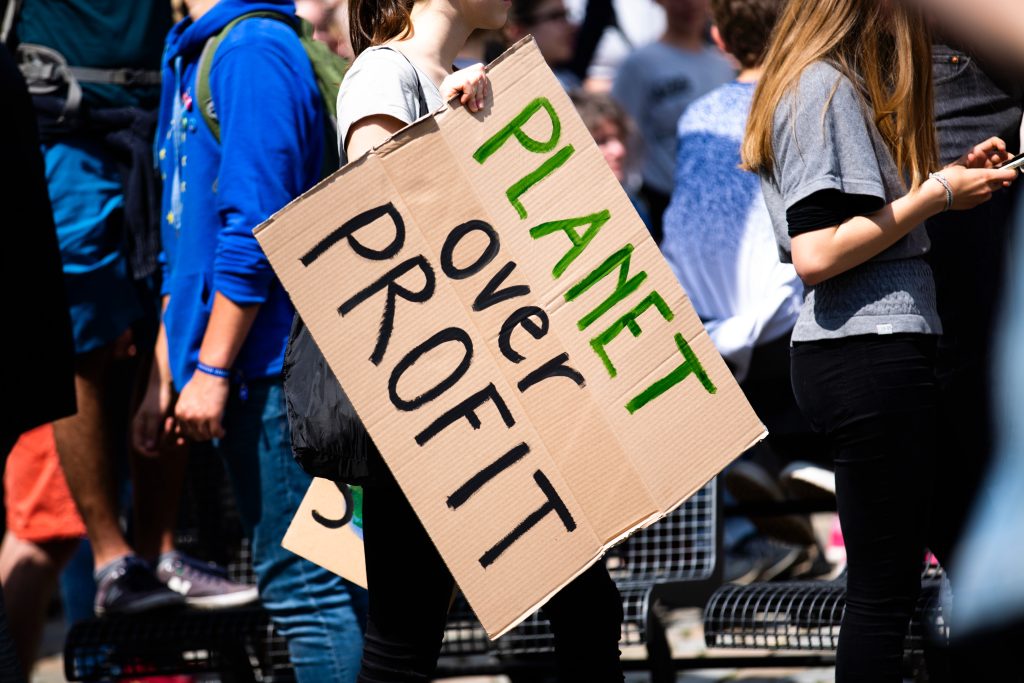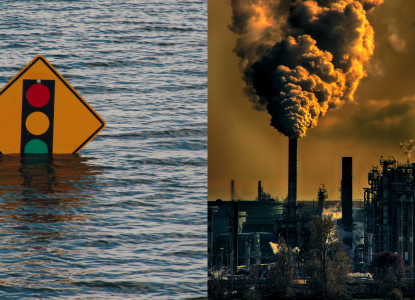By Arthur Lyon Dahl – International Environment Forum, IF20 Environment Working Group.
This blog was originally published on the Global Governance Forum and International Environment Forum websites, and is being republished with permission from Mr. Dahl.
– – –
We find ourselves today in what seems an impossible situation. On the one hand, climate change is accelerating with irresistible force beyond the most alarmist scientific predictions, with a giant leap in global ocean temperatures and record heat waves around the world. To save us from a climate cataclysm, all new development of fossil fuel resources should stop immediately, and their use should be eliminated completely by 2050. Yet they are still highly subsidised, and producing countries and companies are expanding production and making enormous profits. Like a drug addiction, we cannot stop even though renewable energy sources are now cheaper than fossil fuels. No one wants to abandon proven energy sources and systems that are so profitable, and we still need technological breakthroughs for some uses and major transformations in present infrastructure and products.
Then there is the present world economy like an immovable object. The wealthy minority enjoying the consumer lifestyle in the affluent countries and communities, carefully cultivated by advertising and the media to maximise corporate profits, has no interest in being concerned about planetary boundaries or addressing the needs of the half of the world population that is poor. The rich believe that economic growth and technological innovation will solve all problems. They are trapped in an ideology of individualism and personal rights that rejects any interference in the name of solidarity, sharing wealth more widely, or the common good. They use the media and even the educational system to communicate their values and maintain public support. They also control all the levers of power, and have designed the very institutions of government and the economy to protect their interests. What they cannot obtain through manipulating the legal system they pursue through corruption. Greed has become institutionalised.

The deep roots of present economic values
This is nothing new. It has roots in the transformation of values that accompanied colonialism and industrialisation. Jeffrey Sachs has recently explained this most clearly.
“As Britain became an imperial power, and then the world’s leading power of the 19th century, British philosophy changed to justify Britain’s emerging empire. British philosophers championed a powerful state (Thomas Hobbes’ Leviathan), the protection of private wealth over redistribution (John Locke’s right to “life, liberty, and property”), markets over government (Adam Smith’s “Invisible Hand”), and the futility of aiding the poor (Malthus’ law of population). When humanitarian crises arose in the British empire, such as the Irish famine in the 1840s and the famines in India later in the century, Britain rejected providing food aid and left millions of its subjects to starve, even though food supplies were available to save them. The inaction was in line with a laissez-faire philosophy that viewed poverty as inevitable and help for the poor as morally unnecessary and practically futile.”
These values persist in the economy today.
Can anything be done to reconcile the irresistible force of climate change and the immovable object of our economy with its underlying growth imperative?
Is degrowth an option?
Bill McKibben has recently discussed the comeback of the degrowth movement. While the fossil-fuel-powered post-war economy expanded GDP and reduced poverty, first in the West, then unevenly across the world, the 1972 report to the Club of Rome on “The Limits to Growth” already predicted ecological collapse by the mid-21st century, and the debate has now returned with the climate crisis and the urgent need to move away from fossil fuels.
There are still two opposing camps: those that simply want to replace fossil fuel technologies with green substitutes like electric vehicles and heat pumps, and those that warn that such technologies also have environmental impacts, such as from mining the necessary metals and rare minerals, who argue we should consume less and downsize the economy. There is a debate whether or not the market will always find ways to supply the raw materials when the demand is there. While mining impacts may be localised, pollution has become global, and industry has too easily ignored social impacts. Business as usual where profits come first is at the heart of the problem.
McKibben outlines the logic for degrowth. We could easily make do with less in the West, returning to the norms of the 1960s. Extra consumption has not produced more happiness. Given the opposition to change, a slow cultural shift may be necessary, but we don’t have time for that. There are good efforts that demonstrate what is possible if we make the right choices, but climate change requires a fast move to renewable energy. McKibben concludes that we should not waste effort re-creating our current society on a lower-carbon basis, with all the other planetary limits we face. We should instead use the biggest economic shift in human history to move towards greater equality and conviviality.

Transforming values
It seems clear to such leading thinkers that we need a transformation in values alongside a transformation in our economy and technologies if we are to avoid overshoot and collapse. The most recent report from the Earth Commission, “A just world on a safe planet: First study quantifying Earth System Boundaries” of 31 May 2023 shows that “The Limits to Growth” projection of 1972 was broadly right. The new report provides a solid scientific foundation to assess the state of our planetary health not only in terms of Earth System stability and resilience but also in terms of human wellbeing, equity and justice, and many of the safe boundaries are already crossed today.
Transforming economics
How can we respond? Again science provides some guidance. The latest Club of Rome report in 2022 “Earth for All: A survival guide for humanity” defines five turnarounds in transformational economics necessary to avoid economic and social collapse: eliminate poverty, reduce inequality, empower women, transform food systems, and turn around the energy system.
- The poverty turnaround focuses on the solutions to raise the daily income of the poorest half of the world population from $4 to $40. At this level, if inequality is restrained, the majority of people can enjoy higher wellbeing, greater economic security and more economic opportunities. New models can help reverse historic injustices and open the doors for unprecedented investment in clean energy, sustainable food and sustainable cities.
- Countries have become more unequal in most regions of the world, producing deeply dysfunctional, polarised societies. A key goal of the Earth4All inequality turnaround is to ensure the wealthiest 10% take less than 40% of national incomes, as opposed to nearly 60 % today.
- Gender equity is essential for a fair and just future, and a stable planet. Massive investment in education for girls and delivering economic security for women are both critically important for a good life within planetary boundaries. The goal should be full gender equity in terms of agency, rights, resources, and participation in both law and employment.
- The way we farm, transport and consume food affects more planetary boundaries than anything else. Our food systems are due a comprehensive redesign to become a regenerative, sustainable food system that works for all within planetary boundaries.
- The energy system is at the beginning of the most disruptive transformation in a century. Within a generation most countries could achieve energy security for the first time. Solutions to halve emissions in a decade are available, affordable and ready to scale rapidly. Urgent action is needed to implement these solutions.
Putting wellbeing first
The Earth for All report shows that it is feasible to redesign economic and social policies to put our societies on a pathway towards wellbeing for all within planetary boundaries. There is no “one size fits all” for economic systems change. There are different ways to reach these five extraordinary turnarounds depending on different social and political contexts. People should be agnostic about economic growth, which depends on what is growing. Revolutions in energy and food will drive economic growth, and low-income countries need to grow their economies. To accelerate change, governments should upgrade our economic system and redefine what really matters in economic policies: wellbeing. A wellbeing economy is one that serves people and the planet, rather than people and planet serving the economy. Earth4All has developed a wellbeing index as an alternative to GDP that is built on the wellbeing framework. Such new economic and wellbeing indicators would support a shift away from unsustainable consumption as a key driver of GDP growth in high-income countries.
Can we act in time?
We know what needs to be done, as the above makes clear. How to do it is the challenge. We cannot do anything about the irresistible force of climate change. We have ignored the science for too long, and the inertia of the system is too great. It takes many years for our carbon emissions to reach the stratosphere, so today’s heating is the result of historic emissions, and our present releases will increase heating even more some years into the future. Tipping points like the release of Arctic methane are now likely. Sea level rise is already unstoppable, so we can expect up to a billion climate migrants in the coming decades as coastal cities and islands are flooded. We must adapt to the inevitable and show solidarity to the victims. Halting any further release of carbon and restoring natural carbon sequestration are still necessary to prevent the planet from becoming largely uninhabitable.
That leaves the immovable object of our present economic system. How immovable is it really? Perhaps it has inherent flaws that will bring its own downfall, such as the excessive accumulation of public, corporate and consumer debt that has maintained growth so far, and its inherent tendency to concentrate wealth rather than distribute it more equitably that is creating enormous social unrest. The rising costs of climate change, water shortages and food insecurity, not to mention conflict, are adding pressures beyond the normal. Corruption is rampant. In our globalised and interconnected world, any one severe shock will trigger many others, and there is no effective global governance to prevent this from happening. The best we can do is to make our maximum effort for the necessary transformations, especially in values, to build community solidarity as the best protection against crises ahead, and to push for the necessary improvements in global governance in the hope that they can help us to turn the corner in time.
– – –
Arthur Lyon Dahl is President of the International Environment Forum, and a retired Deputy Assistant Executive Director of the United Nations Environment Programme (UNEP), with 50 years’ international experience in environment and sustainability. His most recent focus has been on global governance and UN reform.


